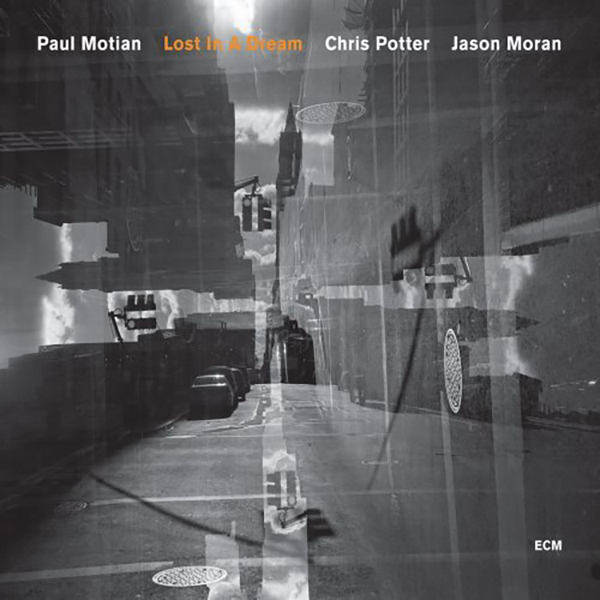
by Ian Mann
March 25, 2010
/ ALBUM
A record that is destined to be viewed as one of the jewels in the already illustrious ECM crown.
As the drummer with two of the most significant groups in jazz history, the Bill Evans Trio and Keith Jarrett’s “American” quartet, Paul Motian’s place in the jazz pantheon is already assured. But Motian’s work as leader should not be underrated. He has recorded a substantial body of solo work, much of it for ECM, and on the evidence of this album even at the age of seventy eight his creative powers show no sign of waning.
Motian’s latest project finds him in the company of long term associate tenor saxophonist Chris Potter, a veteran of Motian’s Electric Bebop Band and Trio 2000 and pianist Jason Moran with whom Motian worked briefly in violinist Jenny Scheinman’s group in 2006. There is thus a neat balance within the group of a player whose work Motian is fully familiar with and something of a wild-card element in the often brilliant Moran. Potter and Moran have collaborated before as members of Dave Holland’s band thus giving this present trio a nice equilibrium.
The album is sourced from live recordings made during the trio’s week long engagement at New York City’s famous Village Vanguard in February 2009. Motian and producer Manfred Eicher selected the very best performances for the album and the programme consists of nine Motian originals with new material featuring alongside the old classics “Birdsong”, ” Drum Music” and “Abacus”. The trio also undertake an exploration of Irving Berlin’s “Be Careful It’s My Heart”.
In a bass-less setting the emphasis is very much on balladry and on the interaction between the three players. Motian’s unique “less is more” approach to drumming is concerned with pulse and colour rather than laying down the beat. His cymbal touch remains sublime and his playing is, as ever, totally musical. Potter’s contribution is assured and lyrical throughout giving credence to the claim that he has matured into the world’s greatest living tenor saxophonist. Moran too is largely lyrical but like his colleagues becomes more forceful as the album progresses. Indeed Motian and Eicher have structured the running order in such a way that the energy levels increase gradually, sometimes almost imperceptibly, throughout the album. The selections are not taken from a single set but Motian and Eicher have structured them as if they could have been.
The opening “Mode VI” and “Casino” are both full of fragile beauty. The pace is unhurried, the musician’s antennae fully attuned and all three are clearly on the same wavelength. You can almost hear them thinking and listening to each other. Eicher’s typically spacious and crystalline production catches all the nuances of these beautiful performances. Potter achieves a remarkable purity of tone on his instrument and is particularly impressive on “Casino”.
The title track features some of Potter’s finest playing on one of Motian’s most attractive melodies and there is an incremental increase in the level of intensity as the trio grow into the music. On the following “Blue Light” Potter adopts a more assertive tone and Moran contributes some spacious, vaguely Monkish piano, a nod perhaps in the direction of one of his principal influences.
Thus far the trio have improvised around Motian’s skeletal melodies and themes putting flesh on the musical bones in brilliant but understated manner. Their brief but beautiful rendition of Irving Berlin’s “Be Careful It’s My Heart” represents a different kind of improvisation as Motian and his colleagues explore the structure of the popular song. The result still fits in briefly with the ethos of the rest of the album.
Motian dips into his distinguished back catalogue for the lovely “Birdsong”, perhaps the most accessible track on the record. Moran is at his most lyrical here with Potter adding a gritty lyricism after the pastoral beauty of the piano/drums intro.
At this point the trio up the energy levels more markedly with the tumbling, turbulent “Ten” probably the most “out” number of the set thus far with Moran’s jagged, percussive piano and Potter’s most powerful playing to date.
The following “Drum Music” continues this more robust approach with Motian very much leading from the drums. His muscular dialogue with Potter is wholly compelling and the baton then passes to Moran who opts for full out attack, thundering away at the keyboard in a reminiscent manner of Cecil Taylor.
“Abacus” from Motian’s 1979 ECM album “Le Voyage” is an old favourite and includes a lengthy, immaculately constructed drum feature for the great man in which he demonstrates that he has lost none of his power and intelligence.
The beautiful closer “Cathedral Song” marks a return to the earlier lyrical approach with a gorgeous melody and some wonderfully controlled playing from the trio. Potter displays a choked, fragile intensity, Moran is responsive and lyrical and Motian’s brush work is a delight.
“Lost In A Dream” is an excellent example of contemporary improvised music. The empathy between the three protagonists is of the highest order and they have produced an album that combines moments of supreme beauty with a controlled power and a keen musical intelligence.
It stands comparison with Motian’s best work and may just be the best thing Potter has ever recorded. It’s all the more remarkable given that this is music that is the result of precious little rehearsal time, this is the sound of an empathic trio thinking on it’s feet.
Here is an album that is likely to appear in the “best of year” lists when the time comes around and in the longer term it’s a record that is destined to be viewed as one of the jewels in the already illustrious ECM crown.
blog comments powered by Disqus